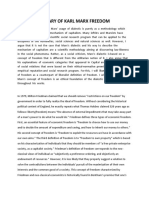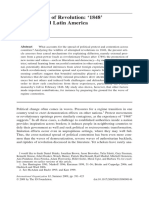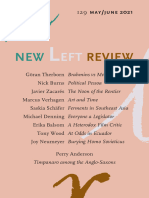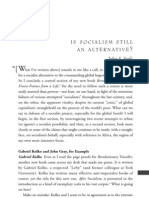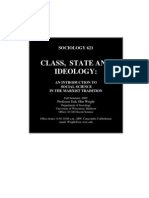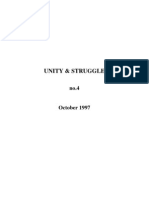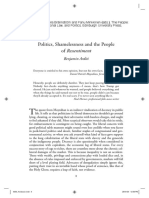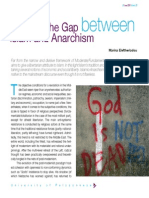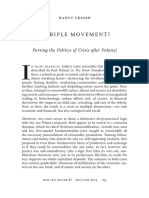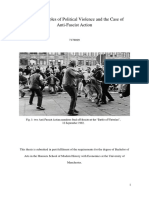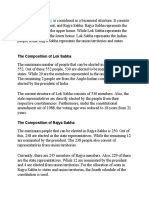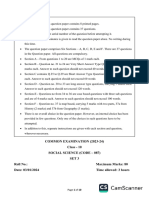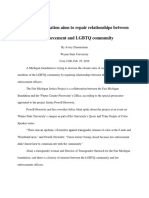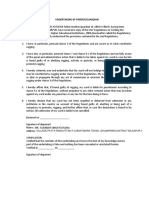Goran Therborn Article "Eurocommunism: Can It Regain The Initiative?" (1980) .
Goran Therborn Article "Eurocommunism: Can It Regain The Initiative?" (1980) .
Uploaded by
Benjamin RosenzweigCopyright:
Available Formats
Goran Therborn Article "Eurocommunism: Can It Regain The Initiative?" (1980) .
Goran Therborn Article "Eurocommunism: Can It Regain The Initiative?" (1980) .
Uploaded by
Benjamin RosenzweigOriginal Description:
Original Title
Copyright
Available Formats
Share this document
Did you find this document useful?
Is this content inappropriate?
Copyright:
Available Formats
Goran Therborn Article "Eurocommunism: Can It Regain The Initiative?" (1980) .
Goran Therborn Article "Eurocommunism: Can It Regain The Initiative?" (1980) .
Uploaded by
Benjamin RosenzweigCopyright:
Available Formats
Goran Therborn
Eurocommunism
CAN IT REGAIN THE INITIATIVE ?
The 1970s have drawn to a close. It is high time to try and summarise
the experiences and lessons within the politics of the 80s.
From a left wing perspective it is natural to take as the starting point
so-called Eurocommunism and its confrontation with the present
developmental tendencies of capitalism. It is in and with
Eurocommunism, the major force of the Western Left, that the
revolutionary labour movement has gained its most important
experiences of the conditions of class struggle under advanced
capitalism in its present phase.
These experiences and lessons are many, complex and valuable.
This article can only be a small contribution to a, of necessity, broad
and extensive debate.
Eurocommunism's short honeymoon
The term 'Eurocommunism' came into use in 1976-77, fashioned by
an Italian journalist, and has since become part of the vocabulary of
the Spanish, Italian and to some extent the French language, but
much less so in Swedish.
In the final part of my What Does The Ruling Class Do When It
Rules2 I tried to point to its strategic content in relation to the history
of the labour movement. Here we will be content to say that
'Eurocommunism' has come to describe a strategy and a tactic for a
socialist social change which has as its starting point the communist
movement's tradition of struggle and which explicitly makes use of
and respects the democratic political institutions which the working
class has achieved but which the bourgeoisie has shaped and
controlled. What gave this strategy and tactic, which had really
evolved through a long and gradual development, news value and
interest to the mass media, were two factors. Firstly, they were
formulated with new clarity and sharpness in 1975-76 in both parallel
and joint statements by the Italian, French and Spanish parties.
Secondly, and above everything else, it looked as if Eurocommunism
was in the very near future to succeeded in opening up a period of
important and quite decisive change in these countries.
After the Italian Communist Party's (PCI) great electoral advances
in June 1976 the old Christian Democratic power system was seriously
shaken, and a broad political opinion became convinced that Italy
could no longer be governed against the Communists. In France, it
looked as though a victory for the union of Communists, Socialists and
left-liberals in the forthcoming elections of March 78 was almost a
certainty. In Spain, a process of democratisation had started after the
death of Franco, a process in which Socialists and Communists could
expect to play a greater and greater and soon leading role.
It did not happen quite like that. The Christian Democrats
succeeded in maintaining most of its power monopoly in Italy, and in
the June elections of 1979 the PCI lost more than half of its gains of
1976. The left wing alliance in France suffered a decisive split in
September 1977 and lost the election in March 1978. The former
phalangist Suarez presides in Spain with an increased majority over
the fragile Spanish democracy, the socialists were pulled to the right
and the PCE is only the third party. What had created the openings of
1975-77 and what closed them in 78-79?
The crisis of the 1947 system
The openings to the left in the middle of the 70s were really the
delayed effects, or perhaps rather, a maturing of the dramatic events
of 1968-69, the student movements, the wave of strikes, the Tet
offensive and the Vietnam movement, and the women's movement.
These movements did not confront and shake, as many of us
believed then, capitalism as a whole, but a particular economic,
political and social system of developed capitalism. This system went
back to the new employment policy of the 30s, which developed with
the experiences of the war mobilisations and really achieved its
definitive form with the dominant position of the USA in the world
after the war and with the Cold War which together put a (temporary)
end to all socialist strivings of the resistance movement and of antifascism.
For that reason we may call it the system of 1947. Notwithstanding
the different national variations and their changes over time we can
identify some common features of the 1947 system, which distinguish
it both from the time between the wars and the period before the First
World War.
The system of 1947 was a complex configuration with economic,
geopolitical, social, political and ideological dimensions.
Internationally it was an economic system of growing trade and
foreign investment, under unchallenged American dominance
(within the capitalist part of the world), facing an entrenched Sovietled power bloc. Each individual advanced capitalist country
experienced a period of unprecedented growth and level of
employment. Decent housing and consumer durables spread to the
working class. Socially the working class became successfully linked
to the bourgeoisie under the slogans and the realities of capital
accumulation and mass consumption. The expansion of the middle
strata provided channels of social mobility. The Left was politically
marginalised or isolated in ghettoes. But the political system also
involved a capitalist acknowledgement of the legitimacy of trade
unions and of an active social and economic policy by the state.
Ideologically, a bland social liberalism was triumphant often
paraded as a pragmatic 'end of ideology' after the fierce ideological
battles of the prewar period.
This system went through several phases, from the hysteria of the
peak of the Cold War to detente, some recessions and partial or
temporary questioning, and many rather different national variations.
On the whole, however, it lingered on till the escalation of the
Vietnam war and till the explosion of student and working class
protest in the late sixties.
Vietnam's successful war of liberation put an end to the USA's
unlimited domination, not only militarily but, in part, also
economically through the effects of the war expenses on the American
balance of payments and the international position of the dollar. The
war in Vietnam was also of great importance to the new radical youth
movement which turned against the whole ideology of 1947,
American liberal imperialism, capital accumulation, institutionalised
it looked as if Eurocommunism was in
the very near future to succeed.
class collaboration, and family consumption. The student movement
questioned the authoritarian form and the bourgeois content and
meaning of mass education, while the women's movement questioned
male dominated society, the patriarchal family and sexual oppression.
The new strike movement broke away from class collaboration and
Marxism Today April 1980 15
its economic model: more accumulation of capital equals more
consumption, full stop. It turned against the speed-up, the degrading
of work, the wearing out of the labour force, against capitalist
dictatorship in the enterprises and also against highly indirect and
limited democracy in the trade unions.
Briefly, new problems, new forces and demands came to the fore.
The 'record years' of capitalism had come to an end. The social and
political system which had been frozen in 1947 and which had, with
minor variations and changes, existed for 20 years was breaking up.
But it was not 'the final day of judgement' for developed capitalism,
and expectations about new revolutionary movements and parties
were soon disappointed.
The new forces came to be expressed as a change and renewal of the
existing labour movement. Trade unions expanded, democratised,
and radicalised. Communist Parties came out of their isolation,
strengthened and renovated. Social Democratic Parties, or at least
sections of them, rediscovered abandoned socialist objectives. Where
the existing labour movement was weak, as in the USA, the new wave
petered out, or re-entered capitalist society, leaving only marginal left
wing effects, mainly among intellectual strata.
Eurocommunism: a response to the crisis of the 1947 system
Eurocommunism, and parallel developments such as the left
orientation of the French and Spanish Socialist Parties and the
Catholic trade unionist radicalisation in Italy, can be seen as both
delayed effects of and as a political answer to the sociopolitical crisis of
the 1947 system. The reorientation of most Western Communist
Parties and their new prospects of power in Latin Europe came out of
the upheavals of the late 1960s. It took time for them to change, and at
first the new movements and the 'old' CPs were at odds with each
other, most dramatically during the May events in France in 1968.
However, it is here that we have to look for the explanation of the
emergence of Eurocommunism. The fissures developing in advanced
capitalism in the latter half of the 60s provided the ground for the
massive new recruitment and rejuvenation of the Communist Parties.
Compared to the movements of 1968, they had kept a more cautious
line vis-a-vis the existing state apparatus, but it also turned out that
they in fact had a much more realistic appraisal of the strength of the
political system. And from the thrusts of 1968 came the new
characteristic features of Eurocommunism: its conception of
socialism as la democratic jusq'au bout, as a thorough demoralisation
of all existing institutions, the workplace, the family, the school, as
well as the state and the economy; the themes of direct democracy and
mass popular participation and self-government; the alliance of 'the
forces of labour and culture'; the new conception of international
solidarity, of solidarity with struggles for liberation and for socialism,
rather than simply with the 'socialist camp'.
Fundamentally, Eurocommunism was an appropriate response to
these new tendencies, a response which took into account the
historical experiences of democracy and dictatorship, the
constellation of power in the advanced capitalist countries as well as
the new radical demands for direct democracy, equality and personal
freedom.
The ambiguous legacy of 1968
However amazing and shocking it would have appeared to the student
and young worker revolutionaries of 1968, Eurocommunism, and
Eurosocialism, can be regarded as a legitimate heir to the new wave of
social rebellion and as a genuine answer to the sociopolitical crisis of
advanced capitalism. But to understand the current problems of the
Communist and Socialist Left we also have to bear in mind that the
movements of 1968 actually contained two different main tendencies,
which only happened to coincide.
the new movements and the 'old' CPs
were at odds with each other.
There was, on the one hand, a popular-democratic upsurge of
protest and, on the other an anti-puritanical individualist rebellion, in
the Fiat works of Turin as well as in the rock culture of 'swinging
London'. These two tendencies were united in their revolt against the
sedate hierarchies of advanced capitalism, and largely under the
impact of the Vietnam war they fused into anti-imperialism and
revolutionary anti-capitalism.
The point is that the movement of 1968 was in part an accidental
conjuncture of influences, the conditions for which later disappeared,
with the end of the Vietnam war, with the rejuvenated labour
movement establishing new positions and with the sharpened crises in
and between socialist countries. In this new situation, the
individualist tendency of 1968 has re-entered late capitalist culture,
providing the latter with a new cutting anti-socialist and anti-political
edge.
The structural economic crisis of the 1970s
The rise of Eurocommunism may be explained as a lagged effect of the
social and political contradictions which led in the late 1960s to a
break-up of the 1947 system. Part of the contemporary difficulties of
the former derive from the increasingly divergent tendencies of 68.
But the main reason seems to be another one. Just when the organised
Left had adapted to the new social and political conditions opened up
in the latter half of the 60s, it had to confront another major crisis of
advanced capitalism. That is the crisis of the economic structure of
developed capitalist countries. Both the earlier socio-political crisis
and the current economic one have contradictory and many sided
manifestations and effects. But whereas those of the former, in spite of
their ambiguity, were overwhelmingly progressive and radicalising,
the current economic one works predominantly regressively and tends
to weaken and demoralise the working class.
Since we are here concerned first of all with singling out political
effects of the crisis, I am not going to enter into any difficult
theoretical arguments but shall restrict myself to pointing out how the
crises express themselves. The economic crisis of the 70s/80s is above
all a gigantic restructuring of the capitalist world system under the
control of the multinationals in alliance with authoritarian bourgeois
'This article was first published in Soaalistisk Debatt, No 5, 1979, the
theoretical organ of the Swedish Left Party Communist. It has been slightly
revised, abridged and updated for Marxism Today. The translation is by
Gunvor Leeson.
2
Published by New Left Books, 1978, and soon to appear in paperback.
16
April 1980
Marxism Today
regimes in some countries outside the main centres of capitalism
South Korea, Taiwan, Hong Kong, Singapore, Brazil, the Arab oil
states and elsewhere.
The oil, shipbuilding and steel crises in all the developed capitalist
countries are perhaps the most dramatic expressions of this economic
restructuring. It involves movements of productive investments,
uncontrolled internal trade and manufacturing within a world system
of giant enterprises. The restructuring also involves the end of another
component of the 1947 system, the Keynesian business cycles and
employment policy, now more or less helpless in front of a
recently lost the elections to a new style
Right which now leads Europe's most
reactionary government.
combination never experienced before, of mass unemployment with
high inflation.
This economic crisis has weakened the working class, with
unemployment and the threat of unemployment, and divided it into
employed and unemployed, above all unemployed youths. Inflation,
together with unemployment, affects different groups in different
ways, gives rise to different demand priorities and divides the working
class and the salaried strata further still.
In Sweden, the international economic crisis has so far been quite
restricted in its expressions and its political effects. The working class
and the labour movement have together maintained a high level of
employment as a priority even under two bourgeois governments, but
neo-liberal notions are spreading, including amongst the social
democratic economists of the country which recently gave the Nobel
Prize to Milton Friedman.
The effects have been most dramatic in Great Britain where a
divided and demoralised labour movement recently lost the elections
to a new-style Right which now leads Europe's most reactionary
government. The decline and partial falling apart of the Danish Social
Democrats are another dramatic political expression of this crisis.
The crisis has also been of great importance to the present
difficulties of Eurocommunism, above all in Italy. In the 1979
elections, the PCI suffered its greatest losses in South Italy; a fall of
10% in Naples, 8% in Palermo, 6% in Rome (with the average for the
country as a whole 4%). The Party is relatively poorly organised here,
and a large part of the advance in 1976 in these areas was due to protest
votes. The PCI joined, and sometimes came to lead, regional and
municipal assemblies. But not even a Communist local politician can
produce miracles with local mass unemployment and poverty in a
capitalist country with a hostile central government. Expectations
could not be met. The crisis has also weakened and demoralised the
working class in other parts of Italy, but most of all where it was
relatively weak already.
Side by side with the large enterprises where the unions have won
many important and advanced demands, there has grown a large
black labour market, where hundreds of thousands of workers are
exploited for minimal wages, without regulated working hours, social
welfare or any kind of security. While the desperate situation as
regards youth unemployment provides terrorism with a social basis.
The crisis also was an important opportunity for splitting the left
alliance in France. It effected the re-evaluation, by the Socialist
Party's technocratic economists and leaders, of the joint programme
of 1972. The opportunities for radical social change were seen as now
more restricted. Influential parts of the Socialist Party came to see the
programme as 'unrealistic', a thesis which was the main theme of the
conservative forces in the election campaigns of 1978.
The fight for employment has also naturally been, and is, a
mobilising demand in the fight of the labour movement. The PCF
here conducts a very militant and partly successful fight, above all for
the threatened jobs in the French steel industry. But the usual
equation unemployment = radicalisation does not work except for
short periods and restricted groups of workers. The dominant effects
are rather short term, immediate demands, and if these are not
generalisable and successful, then division, passivity and
demoralisation can result.
The counter-offensive of the bourgeoisie
The present political winds from the Right get their strength from the
combined effects of the two crises of capitalism, and from the fact that
no progressive solution had been found for the first crisis before the
second broke out. But the right wing trends have their own specific
political and ideological form and dynamism. In the bourgeois
counter-offensive, which since the mid-70s with growing force has set
about closing the openings which were created by the breaking up of
the 1947 system, we can distinguish at least three main tendencies or
ideological themes: militant neo-liberalism, the 'German' model and
the Cold War number 2.
Neo-Liberalism
The militant neo-liberalism is most clearly represented by Margaret
Thatcher in Britain, Glistrup in Denmark and the men behind the
drastic lowering of taxation in California a few years ago, proposition
13. It characterises to a high degree the Carter regime in the USA, and
is present in different variations in other countries. Above all it
represents the nouveau riche bourgeoisie, and sections of
professionals, and their striving to tear up as much as possible of the
concessions which an older bourgeois class originally made to the
working class in the 30s and 40s: an employment and social policy by
the state, and cooperation with the trade union movement.
Neo-liberalism can operate in a world where the conditions for the
old economic policies no longer exist, where there exists both
unemployment and inflation (with the neo-liberals concentrating
entirely on the latter), and where the working class is isolated and
demoralised, and can therefore be more or less ignored or kept under
control.
Neo-liberalism has its mass basis in the privately employed middle
strata in part, and also, among certain sections of the working class,
among the labour aristocracy and among recently proletarianised
strata. It has, particularly in the USA, a further ideological resonance
among the most individualistic currents from 1968.
In France, with the old state-centred traditions of the bourgeoisie,
militant neo-liberalism has succeeded in making only slight headway,
and it has been of even less importance in Italy where the Catholic and
aristocratic charity and 'clientele' policy is an important element in the
system of political power.
In Sweden, it is observed among the Moderates (the most right
wing of the three bourgeois parties in Sweden), but still in a mild form
because of the strength of the working class and the certainly withered
but still continuing popular and petit-bourgeios traditions of the
Centre Party.
Until now, it is above all British and Danish social democracy and
New Deal-liberalism in the USA which have received the hardest
blows from the militant neo-liberalism, but the influence of it can be
felt everywhere in the developed capitalist world.
The German model
The 'German' model is a term that West German social democracy
used about its own policy in the election campaign of 1977, so let us
use it as a description of the tendency in the international
bourgeoisie's counter-offensive represented by West German social
democracy. The SPD, and the West German government led by the
Marxism Today
taken over the USA's role of the
gendarme of Europe.
SPD, play an immensely important role in this counter offensive, on
two levels. First of all, the SPD, both as a party and as a government
has to an increasing extent after Vietnam and Watergate, taken over
the USA's role as the gendarme of Europe, and occasionally in other
parts of the world also. West Germany for one had the most intimate
relations with the Shah's regime in Iran and contributed to the costs of
the Franco-Belgian invasion of Zaire in 1978. The US President,
Gerald Ford, declared publicly in 1975 his gratitude for the anticommunist contributions by the Socialist International, led by the
SPD, in Portugal at a time when the CIA, immediately after
Watergate, was more or less out of action.
The SPD is to a great extent financing the Spanish Socialist Party,
and behind the party leader Felipe Gonzalez's drastic initiative to get
his party to reject its Marxist programme, there are, amongst others,
strong West German pressures.
Before the Carter administration gave expression to it in 1978,
Helmut Schmidt had made it publicly clear that the West German
government regarded as completely unacceptable any communist
participation in the Italian government, a declaration with thinly
veiled economic threats.
Defeated in the Second World War, and since then, unlike West
Germany, without a strong, nationalistic self-conscious bourgeoisie,
Italy (that is to say the bourgeois politicians) is extremely sensitive to
foreign pressures. The recent strengthening of the Christian
Democrats' right wing and the already hardened opposition to
cooperation with the Communists, depends to a not insignificant
degree on the threatening West German shadow.
It is probably not so much the SPD's role as international gendarme
which the Party's campaigners were thinking about when they talked
about the 'German' model. The SPD plays its part in the counteroffensive of the bourgeoisie also on another level. The 'German'
model represents rather a technocratic economic policy which so far
has been relatively successful under the international economic crisis.
It is technocratic administration of capitalism without the militant
neo-liberalism and without giving priority to employment and social
reform policies. A model which rests on the exceptional strength of
West German capitalism and on a mini-solution of the unemployment
problem by a large scale deportation of the workforce imported from
abroad. As an economic policy, the 'German' model represents the
least necessary change to the system of 1947, a cold technocratic
administration which rests more on a trust in the security of expert
knowledge in a disturbed time than on class collaboration for
increased consumption. Its preconditions are a strongly entrenched
capitalism, a surrounding world in crisis and a tamed labour
movement. The model can find a social basis in wide sections of the
bourgeoisie and middle classes in countries with strong state
traditions and likewise among sections of the working class.
In debates in France, President Giscard and his government are
usually given an American liberal label, but in reality it is a policy of
West German character. It is not equally successful, having to
confront a militant labour movement, but it is better fitted to meet the
crisis of the 70s than Gaullism. The 'German' model or a similar
policy has also a significant attraction for a large part of the upper
strata of the new public employees which gather in the Social
Democratic and Socialist parties, from Spain, Italy and France to
Britain and Sweden. It can be found also among the Italian Christian
Democrats' modernistic right wing.
This technocratic administrative model can be said to belong to the
counter-offensive of the bourgeoisie in spite of the fact that many of its
April 1980
17
supporters regard themselves as social democrats or even socialists,
because it means an effort to close or replace the socialist openings of
the 70s with a modernised technocratic administration of capitalism.
It is probably the foremost and most serious opponent to Eurocommunism or Eurosocialism (ie, the Marxist socialism of the left
within the French, Italian and Spanish Socialist Parties) in France,
Italy or Spain. Its theme is to present the Communist Parties and
socialism as 'old fashioned', ie, not corresponding to the level of
capitalist development in the USA and West Germany, and
unrealistic in relation to the restricted room for economic and social
manoeuvring of the international crisis.
The Cold War II
A third tendency in the bourgeois counter-offensive is the successfully
initiated ideological war of the same kind as that of the 50s, above all in
France, but also in Italy, Spain and other countries. The French
so-called New Philosophers are only a small part of this great
operation, a hysterical anti-communism.
That the bourgeoisie is anti-communist is nothing new, and that the
propaganda increases during a political-social crisis is not particularly
remarkable either. Two aspects, however, are repetitious of the 50s
special crisis the first is that in the same way as the McCarthyism of
the 50s turned on progressive forces who neither defended nor
represented a stalinistic policy, so the crusade of the 70s is directed
with growing hysteria against the Eurocommunist parties who clearly
no longer defend or represent either Stalinism or the East European or
East Asian post-stalinism. The second is that the ideological edge is
made up of philosophers and writers who draw their hatred from 'I
believed in and was deceived by Communism'.
This new anti-communism attaches itself partly to the anarchistic
individualism of 1968 and is often, particularly in France, the waste
product of burnt out maoism. It has naturally been taken up warmly
by the bourgeoisie and it has also been exploited by the Socialist
Parties in their competition with the Communists, the least
scrupulous of them being the Italian Socialist Party.
We also need to remind ourselves of the large power resources of the
bourgeoisie which the crises of the 70s left to a large extent untouched
and which are also part of the problem of Eurocommunism.
On the most general level, it is important never to forget the sad fact
that the power of the powerful always has a tendency to create consent
among a large section of those ruled. 'Consent' because of fear, lack of
self-confidence, ignorance about possible alternatives, passivity,
gratitude for small favours.
The dilemma of Eurocommunism
How have the big Eurocommunist parties acted in these two interrelated capitalist crises and within the bourgeois counter-offensive?
Let us first familiarise ourselves with the basic features of their
Its theme is to present the Communist
Parties and Socialism as 'old fashioned'.
situation. Eurocommunism was a result of and an answer to, a
basically correct answer to the 'political-social' crisis, which erupted
at the end the 60s. This crisis was more forceful in France, Italy and
Spain than in other countries.
These countries had a strong communist labour movement (albeit
underground in Spain). The bourgeoisie was more divided (especially
in France, between the Gaullists who were in power after the coup
d'etat type events of 1958, and the non-Gaullists: in Spain between
fascists and 'modern ' conservatives; in Italy between modern capital
and a partly pre-bourgeois political system in Italy). Further, in Italy
and Spain, the new masses of factory workers were not immigrants
18
April 1980
Marxism Today
who could easily be isolated. Eurocommunism involved a confluence
of three elements: the communist movement's proletarian traditions
of struggle, the demands of the new revolt for immediate qualitative
changes at the place of work, in the school, family and politics, and an
open acknowledgement of the strength of the bourgeois-democratic
state and its electoral legitimacy.
The dilemma was, and is, how to hold these components together in
a dynamic tactic and strategy for social change. The crisis of the
economic structure sharpened this threefold dilemma. How to hold a
broad, popular movement together, distributed between the vastly
different expanding and declining branches and regions? How to
unite a militant defence against unemployment and insecurity with
the creating and maintaining of a front broad enough to win a
sufficient majority to change society in a democratic way? How to
unite the new political forces and ideologies of the youth revolt with
the traditions of the working class and with a successful
parliamentarian tactic?
Before we enter into any criticism, it might be underlined that it is
here a question of dilemma for which there is no simple answer. The
three components of Eurocommunism are different in origin and pull
in different directions.
To be able to combine them at all was a great achievement, which
seemed impossible in 1968-69. The new revolt had a predominantly
anarchistic-maoist direction in uncompromising conflict with both
the existing labour movement and with electoral strategies and
socialist revolution under parliamentary-democratic forms.
But it was achieved even though the PCF's slow adjustment created
a deep split between the Party and the students and middle class of the
May revolt, which later became the starting point for the upward
spiral of both the Socialist Party and the ideological diffusion of the
disillusioned maoist anti-communist crusade. The flowering of the
Socialist Party in Spain, on the other hand, had probably more to do
with the Communists' handicap under the Franco regime more than
30-year-old institutionalised anti-communism.
The Italian
the power of the powerful always has a
tendency to create consent among a
large section of those ruled.
Communists rather quickly picked up the new current, both in the
Party and in the trade union movement led by them.
But how can one unite the three components in order to bring about
a socialist change in the face of the economic crisis and its tendency
towards division and fragmentation, and in a sharp struggle with an
opponent with both new and old power resources at its disposal? In
that task Eurocommunism has so far not succeeded. Communist
mistakes have contributed partly to this, which is also admitted,
indirectly by the change in tactics of the PCF, and more openly but
also in restricted fashion by the PCI's central committee meeting in
July 1979.
Errors of Eurocommunism
However, it is important to avoid the typical trotskyist way of looking
at the history of the labour movement: all defeats and lack of success
are brought about by the mistakes and treachery of the leadership.
Bearing in mind all objective difficulties and with full recognition of
the great and exceedingly important results which have been
achieved, it has now become evident that the Eurocommunists made a
serious mistake, a common mistake although in different forms, and
with many different concrete expressions. It can be summed up in one
sentence: an overemphasis of parliamentarian tactics at the expense
both of the revolutionary labour movement and of the new social
movements of 1968. On the parliamentary level, the parties got
entangled in the game of their opponents and lost some (only some) of
their roots in the working class and their contacts with the youth
revolt. The main reason here as far as one can judge was an underestimation of the bourgeoisie's capacity and will to resist, with an
equivalent overestimation of the possibilities for driving the
development forward through agreements between parties and by
parliamentarian manoeuvring. In France, where the greatest
possibilities were and are with the strongest Left and the least
dependence on the USA and West Germany the PCF staked
everything on the party-alliance with the Socialist and left-liberals and
their joint programme from 1972. The weakness of this line, although
Marchais, Carrillo and Berlinguer
in principle correct, was that it was not anchored in a social movement
at grassroots level. This meant that when forces in the Socialist Party,
in step with the electoral advances of the latter and in step with the
evaluation of the economic crisis by the economic technocrats, began
to pull to the right, there was no united movement in contrast to
Chile before the 1970 election which could drive the left alliance
forward and maintain its unity. Caught in the tactics of its own
parliamentarism and electoral calculations, the PCF leadership in the
late summer of 1977, was forced to choose between 'capitulation or
breakaway', and chose the latter in September. The left alliance went
to the polls in March 1978 divided in an even sharper internal polemic,
and narrowly lost. The PCF leadership has since further re-evaluated
its earlier belief in agreements at top party levels. But one can say in
some measure that the policy of left unity, which was called 'unity and
struggle', has in practice developed from 'unity without struggle' to
'struggle without unity'.
In Italy, with its weaker socialist left, heavy foreign dependence,
strong but politically and socially contradictory Catholicism, fragile
democratic institutions, and not insignificant fascist and militant
reactionary groups, the PCI developed a much less ambitious and long
term strategy, the 'historic compromise'. It was and is aimed at
reaching a change in and settlement with the Christian Democrats,
aimed at bringing to life again the radical unity of the anti-fascist
resistance movement between Communists, Catholics and Socialists.
But in the tactical practice, after the electoral advances of 1976, the
line of the historic compromise became, at the national, regional and
local levels, horse-trading with a Christian Democratic governmental
party determined, and egged on internationally, to maintain all real
power. In exchange for vaguely formulated promises of reforms, the
realisation of which were delayed and partly frustrated, the PCI
decided to dampen the more and more frustrated struggle of the
popular classes and movements, a tendency which was reinforced by
the economic crisis. PCI often calls itself a 'party of government and of
struggle', but between 1976-79, the Party became more a government
party without struggle and without the power of government. The
PCI's leadership has now self-critically assessed this whole practice, at
Marxism Today
April 1980
19
the same time as the central committee meeting of July 79, in spite of
some critical voices, re-affirmed anew both the tactical and the
strategic main line.
In Spain, the PCE's line, as in Italy but naturally even more so, is
distinguished by a strong emphasis on the necessity to consider the
fragility of democracy and at the same time an over-valuation of the
possibilities of parliamentarian manoeuvres.
The 'Moncloa pact' of the autumn of 1977 between the government
and the parties of the labour movement and large trade unions came
about to a large extent on the initiative of Carrillo, the Spanish party
leader. It was in a way a deft tactical manoeuvre to avoid the PCE
becoming marginal in a two-party system between the government
party and the Socialists. But in exchange for trade union restraint the
labour movement got a piece of paper about economic, social and
political reforms which the government has for the greatest part left
aside and which the Socialists demagogically refused to fight for,
referring to the Moncloa Pact as a Communist initiative and arguing
that everything would be solved shortly when the Socialists were
returned to power. This they did not achieve, with the Centre Right
winning the elections in March 1979.
of mass politics/parliamentarian politics, is the relationship to
Eurosocialism and social democracy. This is a very important
problem since a socialist transformation of the developed capitalist
countries is only possible through co-operation between Communists
and Socialists. Only in Spain has the development along these lines
made progress recently. At the local elections last spring, PCE and
PSOE made an agreement about mutual support in the elections of
mayors and municipal executives. All Spanish cities with more than
100,000 inhabitants, except two, now have socialist-communist
executives, with a socialist mayor and a communist deputy, except in
Cordoba in Andalusia, where the situation is the other way round.
In France, the PCF continues its vehement polemic with the PS for
the latter's 'right wing turn' in its struggle to win back its role as the
largest party of the Left. The PS has however, since the Congress in
The perspective of the third road
How can one sum up these experiences of the 1970s? What does the
perspective ahead look like?
The dissolution of the economic, political and social system of 1947
has not found any stable solution, neither progressive nor
conservative. Society and politics in the advanced capitalist countries
are in a state of flux and change. The (structural) economic crisis has
only begun and will continue. Eurocommunism, and in its way,
Eurosocialism, brought together the labour movement and its
traditions of struggle and revolutionary theory, the mass movements
of 1968, and parliamentarian-democratic politics in a democratic
socialist mass politics. In this way, Eurocommunism has given the
main line of direction to the still possible progressive road out of the
crisis of advanced capitalism.
Eurocommunism has not yet reached its first goal, the start of
bringing about a change in society, but it and the Left as a whole are
stronger in all respects at the end of the 1970s than they were at the
beginning. The bourgeois counter-offensive has not achieved its aims
either and will continue in different versions and combinations of
versions of neo-liberalism, authoritarian technocracy and hysterical
anti-communism.
The Italian Communists have started to call their line, and parallel
Eurocommunist and Eurosocialist lines, the 'third road' in contrast to
social democracy and Stalinism. In order to develop this third road
further there are at least four big problems which will have to be
resolved more adequately.
1. There is first of all the strategic problem of combining
representative democracy and direct grassroots democracy, mass
movements and parliamentarism. Pietro Ingrao, the foremost
spokesman of the left in the PCI, has defined the objective as one of
developing a mass democracy which unites organs and expressions of
direct democracy at workplaces, residential areas and in different
grassroots movements such as the women's movement, with living,
central parliamentarian institutions. Ingrao emphasises also the
crucial role of the party as the dialectical intermediary between direct
grassroots movements and a unifying policy at a central level, in
contrast to the relatively isolated expression of different radical
protest groups on the one hand and parliamentarian manoeuvre on the
other. In my opinion there is, in spite of the latest self-criticism,
relatively too much of the latter in the PCI and PCE and, after the
tactical changes of 1978, too much of the former in the PCF.
2. A problem of its own, even if it comes under the general problem
March 1979, been led by a marxist, centre-left coalition of clear
Eurosocialist and not social democratic, orientation. The French
Socialists also talk about the 'third road' and about the 'blockage' of
the Swedish democratic model.
In Italy the Socialists have felt threatened by being overtaken by the
'historic compromise' and PSI's new leadership has exploited every
possibility for an aggressive anti-communist polemic, both from the
right with the party leader Craxi's substitution in 1978 of the old
Marxist tradition with Proudhon, and then with the attempt in the
summer of 1979 to form a government with the technocratic right
wing of the Christian Democrats and from the left through, among
other things, contacts with the violent 'autonomist' student
movement and through alliances with the Radical Party. So far
without much progress in either case. At the PCI's central committee
meeting in July 1979, Ingrao developed a programme of closer cooperation with the PSI, but Berlinguer, in his summing up, rejected
strongly making a policy of unity with PSI a priority, and drew
attention to the present PSI's leadership's demand for a social
democratisation of the PCI.
3. The structural economic crisis demands a solution in line with a
democratic socialist mass policy for social transformation. So far,
however, one has to say that Eurocommunism has hardly developed
such a solution. The PCF, most recently at its 23rd Congress in May
1979, has defined the crisis as being 'national, before anything else', as
France's 'decline' under the strategy of big capitalism. The Party
conducts a very militant fight to defend the jobs of the workers in the
steel industry, and also for, among others, the wine growers of the
south of France who are threatened with strong competition if Spain
and Greece join the Common Market. Here the Party has made
certain immediate gains, but in the long term view, more penetrating
analysis of the technological and international dimensions of the crisis
is really required.
The PCI's and PCE's views on the other hand appear too fixed
within the solutions possible as dictated by the logic and space of the
existing economic and political system. Berlinguer speaks of austerity,
a word which more or less means 'restraint' with overtones of 'moral
purification'. This is necessary above all because of the need to clean
up the jungle of corruption, clientelism and parasitic favouritism of
the Christian-Democratic state, but it also involves restraint in
relation to wage demands. The concept and the policy have been
targets for much criticism among the Italian Communists themselves,
but were underlined again in Berlinguer's summing up at the
an overemphasis on parliamentarian
tactics at the expense both of the
revolutionary labour movement and of
the new social movement of 1968.
20 April 1980 Marxism Today
important Central Committee meeting in July 1979.
It should be emphasised that what is called for is not necessarily an
elaborate and realistically viable 'solution' to the economic crisis. The
Social Democratic breakthrough in the Nordic countries in the 1930s
had little effect in real economic terms. In spite of the very
sophisticated theories inspiring them, the economic policies of, for
example, the Swedish Social Democrats had only marginal effects on
the levels of production and employment and on the distribution of
income. Nevertheless, the 1930s constituted an enduring watershed
in the socio-political history of Scandinavia.
What is needed is first of all an understanding of the crisis and of the
realignment of forces it makes possible, and a political formula
expressing this understanding and realignment. In the current
situation this would involve a welding together of the labour
movement in its Eurocommunist, Eurosocialist and leftwing Social
Democratic tendencies with the movements of 1968, within the
parameters of Western politics.
A new internationalism
4. Fourthly, Eurocommunism now faces the necessity to develop a
new internationalism. The capitalist crisis is international and
involves both relations between the advanced capitalist countries and
regions (Western Europe, North America, Japan, Oceania) and
between them and the rest of the world.
The Communist movement is international, and so is its crisis
(opposition/repression within, war and conflict between the socialist
countries). Moreover, the revolutions in the third world are often led
by movements other than the Communist Parties. 'Proletarian
large problems remain. One is the
relation with the Communist Parties
which are in power.
internationalism' can now no longer therefore mean only international
solidarity between the Communist Parties and, even less, primarily,
solidarity with the CPSU.
Here the Eurocommunists have gone quite far, and a central theme
at the last congress of the PCI was the 'new internationalism'. The
foreign guests present at the congress were an expression of the
successful diplomacy of the PCI, which had succeeded in gathering
Russians, Chinese and Vietnamese, Egyptians and Palestinians,
Ethiopians and Somalis, 'orthodox' and 'eurocommunist' parties,
European social democrats, and the liberation movements of the third
world.
But here large problems remain. One is the relation with the
Communist Parties which are in power. The 1979 congresses of the
PCI and PCF took, each in their own way, a clear stand against the
new Cold War: Eurocommunism takes a strong, critical stand against
authoritarian rule in the socialist countries, but there is no intention of
denying the epoch-making historical roles of the October Revolution,
of the Soviet Union and of China, and there is no intention of rallying
to a new cold war and of breaking off relations. This is a clear and
correct attitude, but its practical adaptation is difficult and is going to
be more difficult with the open crisis in and around Indochina, which
is likely to continue, and the internal conflicts in Eastern Europe,
which are likely to worsen.
European politics is becoming more co-ordinated with the
extension and development of the EEC, notably with the new direct
elections to the European parliament. But the co-ordination and
cooperation of the Communist Parties in Western Europe are poor,
not least between the two most important parties of Eurocommunism,
the PCF and PCI. The differences between them express in many
ways the differences in state and society between France and Italy. As
such they are natural, objective differences, but they also express
ideological-pohtical differences of a party nature. As long as they are
not significantly reduced and bridged over, the strength and
possibilities of Eurocommunism will be weakened.
The new internationalism can only come from an increasing
drawing together and cooperation between the Communist Parties
sharing the same basic experiences and problems, including the Eurocommunist parties, the Japanese party, and the increasingly similarly
oriented Latin American parties of Mexico (above all), Chile and
Brazil. The increasingly divergent positions of the PCF and PCI
makes this coming together difficult. On the other hand it is,
potentially at least, being furthered by the new situation in Latin
America, and where the new strategy and tactics for democracy and
socialism are fully supported by the governing Cuban leadership. In
both Europe and Latin America the recent, very important
reactivation of the Socialist International should be taken as a positive
challenge to a movement which has always, though not seldom in
mistaken forms, regarded internationalism as one of its defining
characteristics.
The Swedish VPK 3 should be able to play a role of some importance
in the development of the new communist internationalism. It has an
awful lot to learn from the large Eurocommunist parties, and it would
be very valuable for it if the contacts could be extended below the
diplomatic 'politeness' of official relations. But the VPK has also at
least two important contributions to make. The VPK has an intimate
experience of the most advanced social democracy, of what it has
achieved and not achieved, how and why. And social democracy is
something which is intensively discussed in Latin Europe, but usually
without real knowledge, often painted with a pink glow by the PCI
and painted rather black by the PCF.
Secondly, the VPK operates in the most advanced capitalist
country and has started a discussion about how the great current
technological transformation of capitalism is to be understood and be
met. That is a debate which has not yet been started in either the PCI,
PCF or PCE.
The VPK has also a certain place in the history of Eurocommunism. Although it took time before the new line could flourish
and be consolidated (with left-socialist tendencies coming from
Denmark and Norway, the strong pro-Soviet group and the leftism of
the late 60s), the 20th Congress of the VPK in 1964 and its newly
elected leadership introduced a policy which twelve years later in
Europe came to be known as Eurocommunism.
Postcript February 1980.
The above was written in the late summer of 1979. It was written as a
political intervention in the debate on the Swedish Left, thus with limited
ambitions of analytical depth. What has happened since the original article
was written does not, as far as I can see, call for a revision of the main lines
of argument. But it needs to be said, that the difficulties, divergences and
mistakes of the main Eurocommunist parties singled out above have tended
to be aggravated. This downturn phase of the Left in the advanced
capitalist world, however, should be seen as a conjuncture of recession in a
longer trend of growth. On the whole, the Left remains stronger today than
ten, not to speak of twenty or thirty, years ago. It should be used for a
self-critical and non-sectarian appraisal of the experiences we have made,
for preparing us better for the coming battles for democracy, socialism and
human liberation. Since our basic problems and tasks are common across
state and language boundaries, this appraisal has to be an international
debate. I am therefore very grateful for this opportunity to communicate
with British comrades.
3
The Swedish Left Party Communist.
You might also like
- All Drill MatrixDocument4 pagesAll Drill Matrixsumedhb2186% (7)
- Avishai Margalit - The Decent Society, 1998Document80 pagesAvishai Margalit - The Decent Society, 1998Nicoleta AldeaNo ratings yet
- The System of Accumulation in South Africa Theories of Imperialism and Capital SOA - HigginbottomDocument27 pagesThe System of Accumulation in South Africa Theories of Imperialism and Capital SOA - HigginbottomShih-Yu Chou100% (1)
- KARL MARX ''Freedom''Document4 pagesKARL MARX ''Freedom''dominicNo ratings yet
- Armin Mohler and German ConservatismDocument2 pagesArmin Mohler and German Conservatismuchanski_t100% (1)
- Bosteels, Bruno - Hegel in Mexico Memory and Alienation in The Posthumous Writings by José RevueltasDocument25 pagesBosteels, Bruno - Hegel in Mexico Memory and Alienation in The Posthumous Writings by José RevueltaszvonomirNo ratings yet
- Burawoy, The Functions and Reproduction of Migrant Labor' 1976Document39 pagesBurawoy, The Functions and Reproduction of Migrant Labor' 1976Tithi BhattacharyaNo ratings yet
- Eric Hobsbawm - The Crisis of Capitalism in Historical PerspectiveDocument9 pagesEric Hobsbawm - The Crisis of Capitalism in Historical PerspectivepopolovskyNo ratings yet
- Jawad Botmeh's 2006 Masters Thesis, 'Civil Resistance in Palestine: The Village of Battir in 1948'.Document47 pagesJawad Botmeh's 2006 Masters Thesis, 'Civil Resistance in Palestine: The Village of Battir in 1948'.Benjamin RosenzweigNo ratings yet
- Eclipse and Re-emergence of the Communist MovementFrom EverandEclipse and Re-emergence of the Communist MovementRating: 3.5 out of 5 stars3.5/5 (2)
- Impartiality After Difference - Christine SypnowichDocument30 pagesImpartiality After Difference - Christine Sypnowichmorgenmuffel100% (1)
- Alex CallinicosDocument24 pagesAlex CallinicosmihneatruverulNo ratings yet
- Elgar Companion To Marxist EconomicsDocument422 pagesElgar Companion To Marxist EconomicsTithi BhattacharyaNo ratings yet
- Escritos Políticos Amadeo Bordiga (1919-1966)Document372 pagesEscritos Políticos Amadeo Bordiga (1919-1966)antoniojoseespNo ratings yet
- Inequality and Democratic Egalitarianism: 'Marx's Economy and Beyond' and Other EssaysFrom EverandInequality and Democratic Egalitarianism: 'Marx's Economy and Beyond' and Other EssaysNo ratings yet
- Alain Lipietz Mirages and Miracles Crisis in Global FordismDocument235 pagesAlain Lipietz Mirages and Miracles Crisis in Global FordismBlackrtuy100% (1)
- Chris Harman - Robert Brenner-The Origins of CapitalismDocument26 pagesChris Harman - Robert Brenner-The Origins of CapitalismAnísio LeiteNo ratings yet
- Joan Roelofs, "The Third Sector As A Protective Layer For Capitalism," Monthly Review, Vol. 47, No. 4 (Sept 1995)Document10 pagesJoan Roelofs, "The Third Sector As A Protective Layer For Capitalism," Monthly Review, Vol. 47, No. 4 (Sept 1995)lynk bella huesNo ratings yet
- 2.4.1 Gruening-Origin and Theoretical Basis of The NPMDocument35 pages2.4.1 Gruening-Origin and Theoretical Basis of The NPMLeilani Martínez100% (1)
- Crisis China PDFDocument17 pagesCrisis China PDFDiego NCNo ratings yet
- Hobson Lenin SchumpeterDocument9 pagesHobson Lenin SchumpeterSanchitaNo ratings yet
- The Friends of Durruti Group 1937 1939Document128 pagesThe Friends of Durruti Group 1937 1939lNo ratings yet
- Weyland The Diffusion of Revolution 1848 in Europe and Latin AmericaDocument33 pagesWeyland The Diffusion of Revolution 1848 in Europe and Latin AmericaConstanza Rojas RodríguezNo ratings yet
- Oxford Handbooks Online: Karl Marx and British SocialismDocument17 pagesOxford Handbooks Online: Karl Marx and British SocialismOmar Sánchez SantiagoNo ratings yet
- Social Formation and Modes of ProductionDocument8 pagesSocial Formation and Modes of ProductionDunstan ShetuiNo ratings yet
- Liberal Languages: Ideological Imaginations and Twentieth-Century Progressive ThoughtFrom EverandLiberal Languages: Ideological Imaginations and Twentieth-Century Progressive ThoughtNo ratings yet
- From Cadiz To La Liga - Spanish Context of Rizals Political Thought - Aseniero PDFDocument42 pagesFrom Cadiz To La Liga - Spanish Context of Rizals Political Thought - Aseniero PDFJoTanlogonOcate-AmbongNo ratings yet
- Das Adam Smith Problem-RefinedDocument22 pagesDas Adam Smith Problem-RefinedRyan HayesNo ratings yet
- 2 - The Etics of CapitalismDocument20 pages2 - The Etics of CapitalismMaría GraciaNo ratings yet
- The Grip of Death PDFDocument3 pagesThe Grip of Death PDFMaxim Hristiniuc0% (1)
- (1993) André Gunder Frank. Latin America at The Margin of World System History (In: Comparative Civilizations Review N° 28, Spring, Pp. 1-40)Document43 pages(1993) André Gunder Frank. Latin America at The Margin of World System History (In: Comparative Civilizations Review N° 28, Spring, Pp. 1-40)Archivo André Gunder Frank [1929-2005]100% (1)
- The Deep Causes of Secular Stagnation and The Rise of PopulismDocument22 pagesThe Deep Causes of Secular Stagnation and The Rise of PopulismJesseNo ratings yet
- History of Modern Non Marxian Economics From Marginalist Revolution Through The Keynesian Revolution To Contemporary Monetarist Counter Revolution CompressDocument620 pagesHistory of Modern Non Marxian Economics From Marginalist Revolution Through The Keynesian Revolution To Contemporary Monetarist Counter Revolution CompressGheorghe Craciun100% (1)
- Brazil's Cold War in The Southern Cone 1970-1975 - Tanya HarmerDocument24 pagesBrazil's Cold War in The Southern Cone 1970-1975 - Tanya HarmereersyuNo ratings yet
- Class, State and Ideology (Wright, 2001)Document49 pagesClass, State and Ideology (Wright, 2001)agenisus1No ratings yet
- New Left Review 129, May-June 2021Document164 pagesNew Left Review 129, May-June 2021thinksphereupNo ratings yet
- Murray Bookchin To Remember Spain The Anarchist and Syndicalist Revolution of 1936 A4Document42 pagesMurray Bookchin To Remember Spain The Anarchist and Syndicalist Revolution of 1936 A4rb2166No ratings yet
- Goran Therborn - The Frankfurt SchoolDocument32 pagesGoran Therborn - The Frankfurt Schoolshuuto11100% (2)
- Is Socialism Still An AlternativeDocument19 pagesIs Socialism Still An AlternativeMahalia GearyNo ratings yet
- Bowles, S. (2012) - Three'sa Crowd My Dinner Party With Karl, Leon, and Maynard.Document31 pagesBowles, S. (2012) - Three'sa Crowd My Dinner Party With Karl, Leon, and Maynard.lcr89No ratings yet
- The Rise and Fall of the Privatized Pension System in Chile: An International PerspectiveFrom EverandThe Rise and Fall of the Privatized Pension System in Chile: An International PerspectiveNo ratings yet
- Pilling - The Nature and Significance of Marx's Critique of Classical Political EconomyDocument295 pagesPilling - The Nature and Significance of Marx's Critique of Classical Political EconomymrwhoohooNo ratings yet
- El Debate Brenner WallersteinDocument20 pagesEl Debate Brenner WallersteinAbraham Paulsen100% (1)
- Class, State and Ideology:: Sociology 621Document92 pagesClass, State and Ideology:: Sociology 621here_todayNo ratings yet
- Unity & Struggle No 04Document100 pagesUnity & Struggle No 04Εφημερίδα ΑνασύνταξηNo ratings yet
- Christine Ehrick - Women, Politics, and Media in Uruguay, 1900-1950Document9 pagesChristine Ehrick - Women, Politics, and Media in Uruguay, 1900-1950YamFerreiraNo ratings yet
- Politics Shamelessness and The People O-3Document16 pagesPolitics Shamelessness and The People O-3Benjamin ArditiNo ratings yet
- La Economía Social de Mercado. Orígenes e Intérpretes. Flavio FeliceDocument16 pagesLa Economía Social de Mercado. Orígenes e Intérpretes. Flavio FeliceJuan Pablo SerraNo ratings yet
- Fredric Jameson, ValencesDocument624 pagesFredric Jameson, ValencesIsidora Vasquez LeivaNo ratings yet
- Barnard - The Chilean Communist Party 1922-1947 Thesis PDFDocument437 pagesBarnard - The Chilean Communist Party 1922-1947 Thesis PDFJorge Rojas FloresNo ratings yet
- Bridging The Gap Between Islam and Anarchism-LibreDocument3 pagesBridging The Gap Between Islam and Anarchism-LibrePhyu Zin AyeNo ratings yet
- Neoliberalism and Its Others - The Oxford Handbook Ofilliberalism - Oxford AcadDocument35 pagesNeoliberalism and Its Others - The Oxford Handbook Ofilliberalism - Oxford Acad李小四No ratings yet
- Tony Smith Technology and Capital in The Age of Lean Production A Marxian Critique of The New Economy 2000Document368 pagesTony Smith Technology and Capital in The Age of Lean Production A Marxian Critique of The New Economy 2000HoracioNo ratings yet
- Fraser, A Triple Movement. Parsing The Politics of Crisis After Polanyi-2Document14 pagesFraser, A Triple Movement. Parsing The Politics of Crisis After Polanyi-2Julian GallegoNo ratings yet
- Eagleton B&S in RWDocument14 pagesEagleton B&S in RWvacalocatercermundistaNo ratings yet
- The Business Model PartyDocument33 pagesThe Business Model PartyFafi Peña0% (1)
- IgnaziPP1996549 66Document19 pagesIgnaziPP1996549 66Jimmy IthersonNo ratings yet
- Marxist Left Review #19: Resisting Barbarism: Contours of the Global RebellionFrom EverandMarxist Left Review #19: Resisting Barbarism: Contours of the Global RebellionNo ratings yet
- Josep Puigsech Farràs' 2012 Article, 'Popular Front, War and Internationalism in Catalonia During The Spanish Civil War'.Document22 pagesJosep Puigsech Farràs' 2012 Article, 'Popular Front, War and Internationalism in Catalonia During The Spanish Civil War'.Benjamin RosenzweigNo ratings yet
- The Reception of Perestroika Among Czech Dissidents, Filip Bloem Paper 2002Document8 pagesThe Reception of Perestroika Among Czech Dissidents, Filip Bloem Paper 2002Benjamin RosenzweigNo ratings yet
- Feliks Tych's 1982 Article, 'The Polish Question at The International Socialist Congress in London in 1896: A Contribution To The History of The Second International'.Document44 pagesFeliks Tych's 1982 Article, 'The Polish Question at The International Socialist Congress in London in 1896: A Contribution To The History of The Second International'.Benjamin RosenzweigNo ratings yet
- Rainer Traub's 1978 Article, 'Lenin and Taylor: The Fate of "Scientific Management" in The (Early) Soviet Union'.Document11 pagesRainer Traub's 1978 Article, 'Lenin and Taylor: The Fate of "Scientific Management" in The (Early) Soviet Union'.Benjamin RosenzweigNo ratings yet
- Yutaka Okuyama's 2014 Article, 'A Missed Opportunity or Party Rational? Ambivalent French Communists in May 1968'.Document8 pagesYutaka Okuyama's 2014 Article, 'A Missed Opportunity or Party Rational? Ambivalent French Communists in May 1968'.Benjamin RosenzweigNo ratings yet
- Erik M. Davis' 2013 Masters Thesis, 'The United States and The Congo, 1960-1965: Containment, Minerals and Strategic Location'.Document105 pagesErik M. Davis' 2013 Masters Thesis, 'The United States and The Congo, 1960-1965: Containment, Minerals and Strategic Location'.Benjamin RosenzweigNo ratings yet
- Richard Hall's 2014 Article, 'The Implications of Autonomist Marxism For Research and Practice in Education and Technology'.Document18 pagesRichard Hall's 2014 Article, 'The Implications of Autonomist Marxism For Research and Practice in Education and Technology'.Benjamin RosenzweigNo ratings yet
- On The Principles of Political Violence and The Case of Anti-Fascist Action PDFDocument59 pagesOn The Principles of Political Violence and The Case of Anti-Fascist Action PDFBenjamin RosenzweigNo ratings yet
- Parliament: The Composition of Lok SabhaDocument2 pagesParliament: The Composition of Lok SabhaEinah EinahNo ratings yet
- Gregorovius. History of The City of Rome in The Middle Ages (Hamilton, Trad.) - 1894. Volume 4, Pt. 1.Document336 pagesGregorovius. History of The City of Rome in The Middle Ages (Hamilton, Trad.) - 1894. Volume 4, Pt. 1.Patrologia Latina, Graeca et OrientalisNo ratings yet
- QP-Socialscience-10-Common Exam Set-3Document10 pagesQP-Socialscience-10-Common Exam Set-3Aryan Pratap SinghNo ratings yet
- Onus! Play Aids A4 PFDocument9 pagesOnus! Play Aids A4 PFz1b2a3i4r5a6l7i8mughal90No ratings yet
- Books On Special Prices - Adityabooks - 17may2015Document8 pagesBooks On Special Prices - Adityabooks - 17may2015pmbhatNo ratings yet
- Herrera Vs - ComelecDocument11 pagesHerrera Vs - ComelecEllice CresciniNo ratings yet
- Directors Task-Aashrith SharmaDocument8 pagesDirectors Task-Aashrith SharmagzvwvtmrckNo ratings yet
- Star Wars - FFG - Ad - Set 7Document3 pagesStar Wars - FFG - Ad - Set 7Max KlostermannNo ratings yet
- Ipol Stu (2023) 741374 enDocument122 pagesIpol Stu (2023) 741374 ensilviaNo ratings yet
- Colby Action For Palestine - Statement of PurposeDocument3 pagesColby Action For Palestine - Statement of PurposeMaine Trust For Local NewsNo ratings yet
- British Prime Minister, It's Power and PositionDocument2 pagesBritish Prime Minister, It's Power and PositionGoharz295% (20)
- Hard News StoryDocument4 pagesHard News Storyapi-334917790No ratings yet
- 41 High SeriesDocument4 pages41 High SeriesAnon MusNo ratings yet
- Conditions in Asia in The 19th CenturyDocument15 pagesConditions in Asia in The 19th CenturyRoann Lador BendebelNo ratings yet
- Ram B. Lumiqued HistoryDocument3 pagesRam B. Lumiqued HistoryRAM LUMIQUEDNo ratings yet
- Mohandas Karamchand Gandhi: "Gandhi" Redirects Here. For Other Uses, SeeDocument41 pagesMohandas Karamchand Gandhi: "Gandhi" Redirects Here. For Other Uses, SeeRayudu VVSNo ratings yet
- Sweta Tripathi CaseDocument2 pagesSweta Tripathi CaseJashaswee MishraNo ratings yet
- Lord Curzon and The Creation of The North-West Frontier Province (1901) : An AppraisalDocument13 pagesLord Curzon and The Creation of The North-West Frontier Province (1901) : An AppraisalnadiasajjadNo ratings yet
- Future Tenses Exerciseswillbe Going To and Present - 79612Document2 pagesFuture Tenses Exerciseswillbe Going To and Present - 79612Gihan Al Hawary0% (1)
- Undertaking by Parent/Guardian: Village Patta-Ranauttan P.O.Bhatwara Tehsil Ghumarwin District Bilaspur H.PDocument1 pageUndertaking by Parent/Guardian: Village Patta-Ranauttan P.O.Bhatwara Tehsil Ghumarwin District Bilaspur H.PAbhay SinghNo ratings yet
- Cases For Robbery Part 2Document156 pagesCases For Robbery Part 2Raf RufNo ratings yet
- SPREAD SHEET FOR MANAGERS Activity 2Document3 pagesSPREAD SHEET FOR MANAGERS Activity 2Poonguzhali R (225012301289)No ratings yet
- PH ASF Diseases Status As of 15 July 2022Document40 pagesPH ASF Diseases Status As of 15 July 2022Juliet Czarina Furia EinsteinNo ratings yet
- Panchayat Raj Act and RulesDocument328 pagesPanchayat Raj Act and RulesSumant Mishra100% (1)
- Erwin Rommel Attacks PDFDocument2 pagesErwin Rommel Attacks PDFTeresa0% (1)
- THE DIFFERENCE MADE BY BIBLICAL FAITH IN THE FIRST 100 YEARS C.E. Pages 29-39Document11 pagesTHE DIFFERENCE MADE BY BIBLICAL FAITH IN THE FIRST 100 YEARS C.E. Pages 29-39WCFCurriculumNo ratings yet
- Bataclan - v. - Medina L-10126, 22 October 1957, 102 Phil. 181Document6 pagesBataclan - v. - Medina L-10126, 22 October 1957, 102 Phil. 181Juls EspyNo ratings yet
- KSR ပိုပိုလွင်Document4 pagesKSR ပိုပိုလွင်zinkowinn3.nmkNo ratings yet
- Top 100 Web Vulnerabilities: S.No Vulnerability Root Cause Impact Mitigation Injection VulnerabilitiesDocument33 pagesTop 100 Web Vulnerabilities: S.No Vulnerability Root Cause Impact Mitigation Injection Vulnerabilitiesripper.g5520No ratings yet



